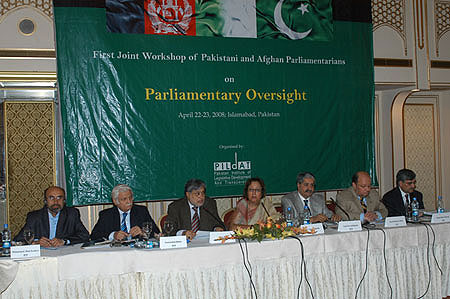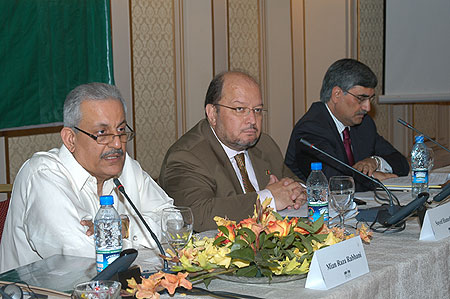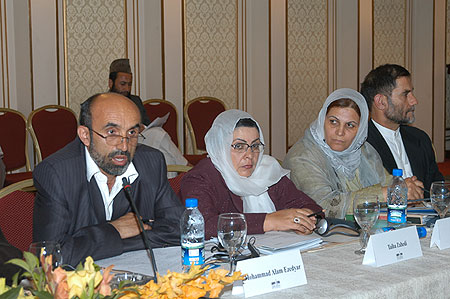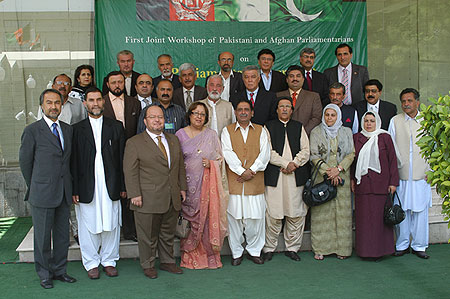|
|
| |
| EVENTS |
|
|
> Pak-Afghan Inter-Parliamentary Committee on Terrorism, other Issues demanded
First Joint Parliamentary Workshop for Pakistan and Afghan MPs concludes |
| |
|
Workshop
April 24, 2008
Marriott Hotel, Islamabad
|
|
| |
Parliamentarians from Pakistan and Afghanistan have demanded joint oversight on terrorism policies adopted by Pakistan and Afghanistan through setting up of Parliamentary Committees comprising MPs from both countries. �The policies adopted by the two countries to manage terrorism need to be driven by the aspirations of the people and not of foreign countries and donors. Members of Parliament are in a best position to ensure that governmental policies respect public wishes of the people of two countries,� said Pakistani and Afghani MPs during the concluding session of the 2-day PILDAT-organised Workshop on Parliamentary Oversight. |
|
| |
PILDAT organised the First Joint Workshop of Pakistani and Afghan parliamentarians and parliamentary staff on �Parliamentary Oversight� from April 22-23, 2008 in Islamabad with the support of the British High Commission in Islamabad. The Workshop was planned with the objective to enhance mutual understanding on parliamentary oversight prevailing in the two neighbouring countries, to share lessons and learn from each other�s rules and practices. The two-day workshop comprised four sessions focusing on Significance of Legislative Oversight in a Democratising Society, International Experiences of Legislative Oversight, Key Challenges in Legislative Oversight and Strengthening Legislative Oversight. A special background paper entitled �Parliamentary Oversight of the Executive in Pakistan and Afghanistan� was prepared to brief the parliamentarians on the oversight mechanisms prevailing in both the countries, to highlight the challenges in undertaking effective oversight and to suggest a way forward for effective participation of parliamentarians in the oversight and accountability of the Executive
|
|
| |
A delegation of 13 MPs and 1 parliamentary staffer from Afghanistan, led by Honourable Sayed Hamed Gailani, First Deputy Speaker of the Meshrano Jirga, participated in the two-day workshop. Over 40 Members of the newly elected National Assembly of Pakistan, in addition to senior members of the Parliamentary Secretariats of Pakistan also participated in the Workshop. |
|
| |
Upon the successful completion of the workshop, members of the Pakistani and Afghan Parliaments jointly put forward 26 recommendations for improving parliamentary oversight of their respective legislatures. Afghan MPs also demanded that Afghan media should be allowed to be broadcast in Pakistan. Following is the list of joint recommendations: |
|
| |
Strengthen capacity-building institutions to support legislatures and legislators in Pakistan and Afghanistan Democracy is the only guarantee for improved neighbourly relations between Afghanistan and Pakistan. All ties need to be built through Parliament and Democracy Parliaments� role needs to be enhanced to develop understanding between Pakistan and Afghanistan
To ensure greater inter-Parliamentary interaction in the future PILDAT, together with Parliaments of Pakistan and Afghanistan should institutionalise the dialogue between Members of Pakistan and Afghanistan Parliament. Dialogue should be held on six-monthly basis by rotation in Pakistan and Afghanistan
Parliaments to effectively oversee that the two countries� foreign and domestic policies follow the aspirations of the people instead of being driven by foreign countries and donors Regional cooperation between Afghanistan, India and Pakistan specifically to be able to find ways to stem out terrorism (on the same lines as a joint Pak-Afghan Jirga held previously) A Joint Parliamentary Committee on Terrorism should be established including Afghanistan and Pakistan Parliament Pakistani Parliament should discontinue counting weekends and free days in between sittings towards the total count of days of sittings. Instead of 4 hours, the Parliament should meet for 8 hours daily according to a set schedule Ethics Committee of the Parliament should be established (Pakistan) Members of Parliament should not be given Development Funds as development is the domain of Local Governments. The spending of earlier funds should be scrutinised by the Parliamentary Ethics Committee working hours for 180 Working Days (Pakistan) Budget Session needs to be made longer in duration. It should be of minimum 45 or 60 days. Parliamentary Committees should have a defined role in the Budget Process, both before and after the presentation of the Budget (Pakistan) Sufficient user-friendly budget details need to be provided to parliamentarians (Pakistan) Defence budget should also be presented in full details to the Parliament for scrutiny and approval (Pakistan) No Question (by a parliamentarian) should be killed in the chamber of the Speaker Other laws should not be included or hidden in the Finance Bill Create a sub-committee or a Parliamentary Committee to oversee the Intelligence Agencies Pre-Budget discussion of proposals to be organized in the Parliament Joint Committee on Public Accounts be established (including members from both the Senate and the National Assembly) (Pakistan) Early formation of committees be incorporated into Parliamentary rules and adopted in practice (Pakistan) Prime Minister�s Question Hour to be introduced in the National Assembly (Pakistan) Greater interaction between the committees with the Media, Citizens� Organisations and Research bodies, etc.
Committees be provided with more staff and resources especially research staff
Committee on Government Assurances be made balanced Chairperson of the Public Accounts Committee to be from the Opposition
Afghani media and TV should be allowed to be broadcast in Pakistan A Core Group of South Asian MPs needs to be formed and facilitated by PILDAT to monitor the implementation of the recommendations. The efforts need to be pursued in a regular and systematic manner and should not be allowed to lose momentum
|
|
| |
The two-day workshop was inaugurated by Hon. Senator Mir Jan Muhammad Jamali, the Acting Chairman of the Senate. Key note speakers on the first day of the workshop included Hon. Sayed Hamed Gailani, First Deputy Chairman, Meshrano Jirga, Afghan Parliament; Hon. Dr. Najma Heptulla, Member Rajya Sabha, India/ Former Deputy Chairperson, Rajya Sabah and President Inter- Parliamentary Union (IPU); Hon. Senator Raza Rabbani, Leader of the House in the Senate; Senator S. M. Zafar, Chairman, Senate Functional Committee on Human Rights; Senator Mushahid Hussain, Chairman, Senate Foreign Affairs Committee; Secretary General, Pakistan Muslim League; Former Federal Minister of Information, Hon. Mr. Riaz Fatyana, Member of National Assembly of Pakistan and Former Member of the Public Accounts Committee, National Assembly of Pakistan; Hon. Mir Ahmad Joyenda, Deputy Chairman of International Relations Commission, Wolesi Jirga, the Lower House of the Afghan Parliament. Speakers on the second and the concluding day of the workshop, in addition to Senator Muhammad Ishaq Dar and Syed Naveed Qamar included Mr. Farhatullah Babar, Former Senator & Spokesman of the Chairman, Pakistan Peoples Party; Dr. Abdul Hafeez Sheikh, Former Senator and Former Federal Minister, Mr. Gohar Ayub, Former Speaker of the National Assembly of Pakistan, and Dr. Najma Heptulla, Member Rajya Sabha, India/ Former Deputy Chairperson, Rajya Sabah and President Inter- Parliamentary Union (IPU); Mr. Muhammad Alam Ezedyar, Chairman of the International Relations Commission of the Meshrano Jirga, Afghan Parliament. |
|
| |
Addressing the session on Budget and oversight, Federal Minister for Finance Senator Ishaq Dar proposed a joint Public Accounts Committee of the Senate and the National Assembly to make use of the most recent reports of the concluded fiscal years. Senator Dar added that the regulatory bodies such as NEPRA, PEMRA and PTA should be monitored and have their performance appraised by the Parliament. He also supported establishment of a Joint Parliamentary Committee to recommend appointments of judges of the superior courts and possibly those of the Ambassadors, Auditor General of Pakistan and Federal Ombudsman from among other senior positions. Responding to a question on the fiscal imbalances witnessed in the pre-1999 era, Senator Dar pointed out the manoeuvring of accounts and the �criminal� negligence of the last government in letting the over-run for the year 45%7 exceed 10%0 billion Rupees in relation to the total revenue of 1 trillion Rupees for the same period. Senator Ishaq Dar believed that the budget-making process needs to be made transparent by strengthening the Standing Committees of the Parliament, which even while exercising their existing rights can play an effective monitoring role. |
|
| |
Syed Naveed Qamar, Minister for Ports and Shipping ad Privatization and Investment; Former Federal Minister of Finance and Economic Affairs, mentioned that the a part of the Budget which is presented to the Parliament (the Finance Bill), including the proposed taxation measures, does not go through the normal legislative process and is not presented to any Standing Committee of the Parliament or to the Senate. This bill often contains controversial subjects which the government would like passed without any debate. In this context, he pointed out the limited time available for the budget debate in the Parliament and drawing from the example of the lengthy Indian budgetary process lasting for months, he recommended that the Pakistani Parliament should also adopt the same practice. |
|
| |
Deputy Speaker of the National Assembly, Mr. Faisal Karim Kundi while making his concluding remarks, said that every effort was going to be made by the current guardians of the House to ensure parliamentary supremacy. He welcomed the initiatives by PILDAT and stressed that more and more such endeavours were needed to strengthen the capacities of newly elected legislators.
Earlier, on the first day of the workshop, Pakistani and Afghani Parliamentarians declared that they remain joined in their struggle for strengthening democracy and parliamentary oversight. Indeed, they concluded that a lack of democracy and democratic institutions in either one of the two countries will be detrimental to the relations between the two countries. In his opening remarks, Mr. Ahmed Bilal Mehboob, Executive Director of PILDAT, outlined the main objectives of the workshop, hoping the workshop would not only provide the parliamentarians with a better understanding of the parliamentary oversight rules, procedures and practices but will also help in nurturing better relations between Pakistan and Afghanistan.
�This dialogue needs to be institutionalized and I urge PILDAT to hold the dialogue every six months�, suggested Senator Mushahid Hussain Sayed. �In addition to Islamabad and Kabul, Delhi should also be a venue for these Parliamentary Dialogues between the three neighbouring countries,� suggested Dr. Najma Heptullah, Member Rajya Sabha, India. Senator S. M. Zafar urged that in addition to sharing wealth of information and best practices on Parliamentary strengthening, the MPs of three countries can play the most pivotal role in regional harmonization and improving relations.
Members of Pakistan and Afghan Parliaments shared common struggles in establishing democracies in their respective countries and called for institutionalizing the interaction of Pakistani and Afghan Parliamentarians at Parliament-to-Parliament and people-to-people levels. This would lead to establishment of friendlier relations between the two neighbours.
Initiating the workshop, Sayed Hamed Gailani, Deputy Speaker of the Meshrano Jirga, Afghanistan, expressed his gratitude to the international community for supporting establishment of democracy in Afghanistan. He believed that the parliamentary traditions and practices are slowly developing a culture of tolerance in Afghanistan and the people are learning to exercise their rights without resorting to violent means of expression. Dr. Najma Heptulla, while, presenting a comparative view of the Indian Parliament and its role in carrying out effective oversight of the other organs of the state, added that in order to avoid a conflict of interest on part of the members of the ruling party, the Indian Parliamentary rules of procedures provide for the Chairperson of the Public Accounts Committee of the Indian Lok Sabha to be a member of the Opposition. Additionally, she believed that the Rajya Sabha or the Upper House of the Indian Parliament (indirectly elected) is freer from the pressures of the constituency and legislation, and therefore, can perform the oversight functions better than the Lower House of the Parliament � a situation similar to the one existing in Pakistan.
Commending the initiative of PILDAT to hold this First Joint Workshop of Pakistani and Afghan Parliamentarians on significance and challenges of parliamentary oversight Senator Mir Jan Muhammad Jamali called for strengthening of the institution of the Senate through direct elections as well as providing it with more financial oversight powers on the executive. Additionally, he stressed that the emphasis of Pakistani Parliamentarians on implementing development projects at the local body levels creates issues of transparency. The parliamentarians, he recommended, should focus on legislative and oversight functions of the Parliament and refrain from interfering in the development affairs of the local bodies. The Constitution of Pakistan, Senator Raza Rabbani, the leader of the House in the Senate of Pakistan believed, has been placed in abeyance and defaced to a great extent with an extreme imbalance existing between the Presidency and the Parliament. He stressed that the oversight functions of the Parliament cannot be delivered effectively unless the Constitution is rid of the restricting sections such as the 58-2(b) and the Schedule 6, which allow for dissolution of the Parliament on the whim of one individual and prohibit the Parliament of Pakistan from enacting laws without the specific approval of the President, respectively. Senator Rabbani stressed that his government was committed to restoration of democracy and the Constitution of Pakistan in its original form.
Mr. Riaz Fatyana, MNA and former member of the Public Accounts Committee added that the Parliamentary Committee system in Pakistan remains very weak due to a frequent disruption in the democratic process of the country, a lack of awareness on part of the citizens and the civil society as well as a lack of monitoring by the media. Mr. Fatyana stressed that the Committee meetings should be open to the public and to the media. Similarly, schedule and agenda of the Committees should be made public in advance and minutes of meetings, publications and reports of the Committees should be made available on the internet. Senator Mushahid Hussain Sayed stressed that difference of opinion between countries and between political parties of a country is crucial for strengthening of democracy and that an �officially certified truth� does not exist. Senator S.M. Zafar while endorsing the idea recommended that Parliamentary Committees should adopt suo motto jurisdiction over important issues for effective oversight of the government institutions. He mentioned the example of the Senate Standing Committee on Human Rights which effectively utilized the suo motto jurisdiction to call into attention human rights abuses in the country.
The delegates and resource persons were honoured by PILDAT through distribution of traditional Pakistani plaques and certificates to them at the concluding ceremony. Earlier, the Acting Chairman Senate of Pakistan Mir Jan Mohammad Jamali hosted a dinner in the honour of the visiting Afghan delegation on April 22, 2008. The next series of the Joint Workshops of Pak-Afghan Parliamentarians are scheduled to be held in Kabul and Islamabad in the summer and autumn of 2008, respectively. |
|
| |
|
|
| |

|
|
| |
|
|
| |

|
|
| |
|
|
| |

|
|
| |
|
|
| |

|
|
|
|
|
|
|
|
|